Letter from Africa: Why has Kenya's staple food gone into hiding?
- Published
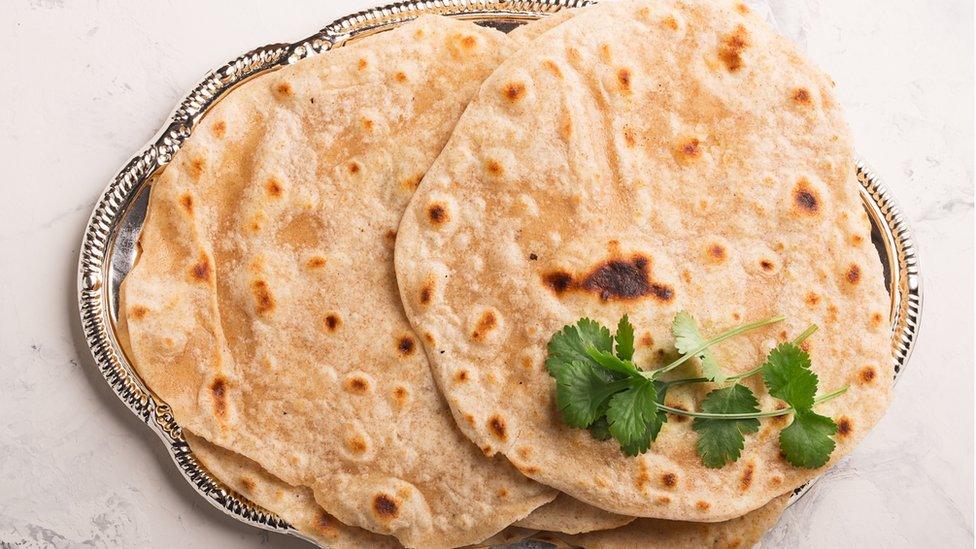
Why are ordinary Kenyans swapping ugali for chapati?
In our series of letters from African journalists, Joseph Warungu explains why maize, Kenya's staple food has gone missing from dinner tables amid escalating food prices.
Welcome to my office kitchen and help yourself to some chapatis.
I'll write this as I cook and you can read it as you eat.
You see I am trying to find an alternative to my staple dish. And I would also like to explain why it has become a source of political controversy.
I'm now learning how to make chapatis - a type of flatbread that is reserved for special occasions here - because it's normally quite expensive.
Ok, so it says on this internet recipe that I'll need:
•2 cups of wheat flour
•1 cup of lukewarm water
•1 tablespoon of salt
And this will give me about 10 chapatis. Excellent!
So why am I making chapatis?
Because the national staple food, ugali, is proving to be out of reach for many people.
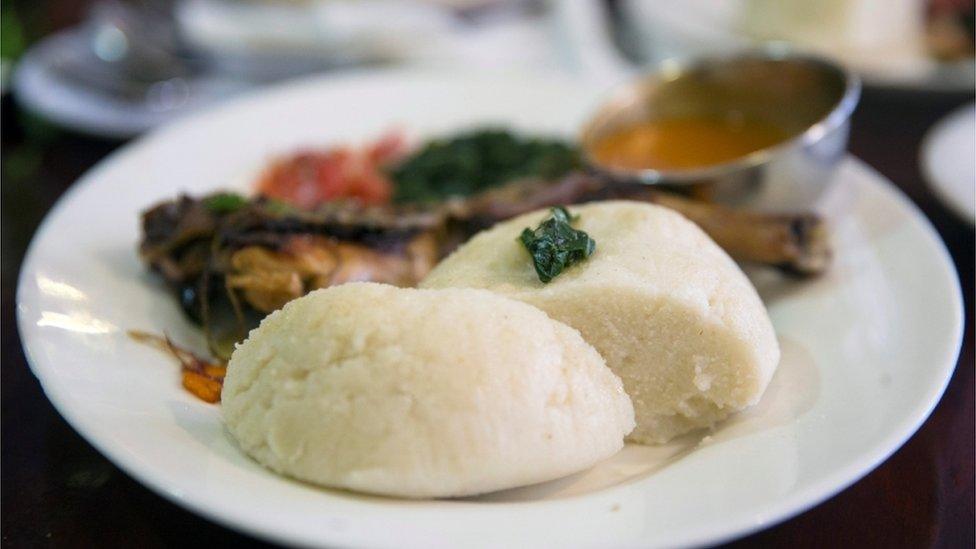
Ugali can be eaten with anything
They call it foofoo in West Africa, sadza in Zimbabwe or nshima in other parts of southern Africa.
Ugali is made from maize flour - and maize has been scarce in the last few weeks in Kenya, forcing the price of its flour to almost double.
But the price of its close cousin, wheat flour, is friendlier. With ugali becoming unaffordable, many Kenyans have switched to chapatis.
For ugali all you need is boiling water, maize flour and strong hands to pound, mash, and knock the stuff into some edible form. Chapatis on the other hand require skill…
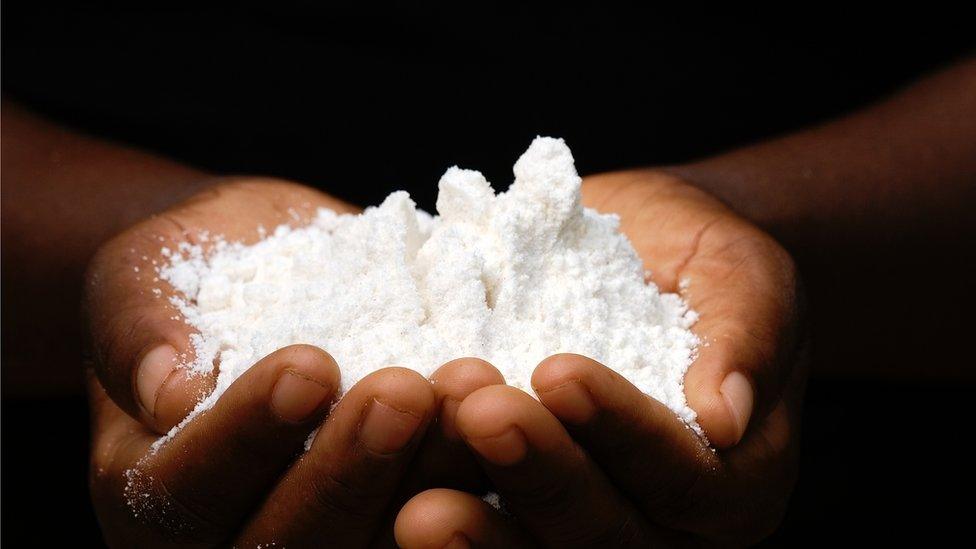
For ugali all you need is boiling water,maize flour and strong hands to pound
Let's see - my recipe says I should pour the wheat flour, salt, some sugar and cooking oil into a bowl and mix the ingredients together… ok, that's done!
As politicians in many parts of Africa know, you can mess with the economy and meddle with the justice system, but you should never ever play around with the people's staple food.
So when the Kenyan government saw the price of maize flour spiral to one of its highest points in over six years, it decided to act.
It removed duty on the importation of maize and subsidised local millers to produce cheaper maize flour.
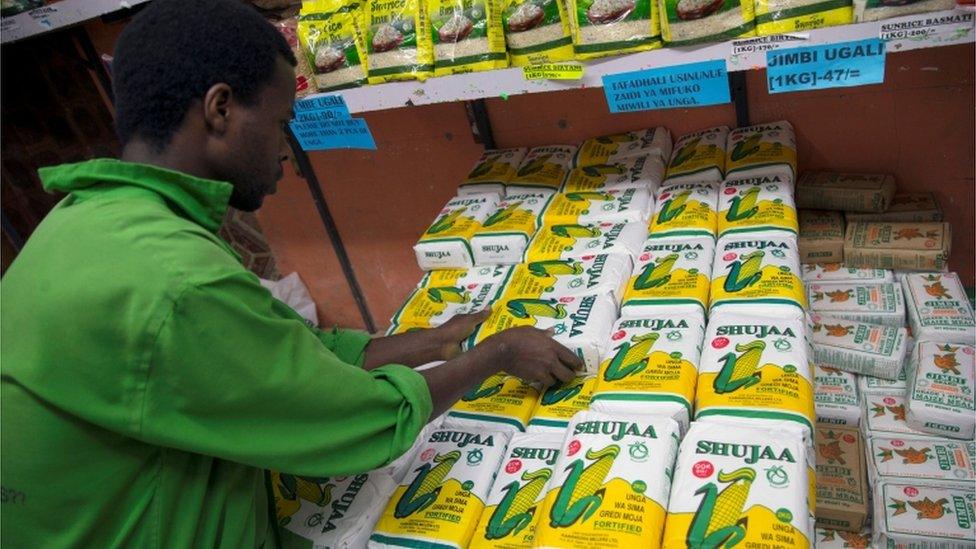
The Kenyan government subsidised maize flour
The government initially told its people that it had imported almost half a million bags of maize from Mexico in a record time of two days.
This was until someone pointed out that Mexico is not a neighbouring country and it would have required almost six weeks for the shipment to arrive in the port of Mombasa from Mexico.
This was the start of an ugly game of ugali wars.
Sorry, give me a moment as I check on my chapatis. I need to place the dough into a bowl and cover it with a cloth to give it time to come together. That was quite easy!
Back to ugali politics.
The general election in Kenya is in early August.
No African quite believes that any government would risk a food shortage this close to an election.
So, as some were praising the food subsidies as the actions of a caring government, critics have jumped in accusing the government of creating an artificial shortage in order to be seen as the angel of mercy coming to the aid of hungry Kenyans.

More about the Kenyan election:

So why exactly is ugali missing from my plate?
In my chapati wisdom, the explanation has nothing to do with erratic weather patterns, nor poor food production.
We are simply victims of the ever-hungry cartels that have exploited all sectors of the Kenyan economy with impunity.
After gobbling up public finances in shady tender deals and manipulating other areas of production and service delivery, the cartels turned their attention to a basic commodity - maize.
The powerful cartels capitalise on one big weakness among Kenyans - their short memory.
History lessons
They may not remember that in 1964, just one year after independence, one of Kenya's first major scandals revolved around maize shortage.
The then minister for agriculture, the late Paul Ngei was accused of abusing his office and smuggling maize leading to shortages in 1964 and 1965.
The modern cartels have been accused of using similar tactics of mopping maize from the market, creating a shortage and then reselling the commodity at a higher price.
It says here that I should divide the dough into 10 small balls and dip them into flour. Each ball should have a diameter of around 8 centimetres. Who measures this kind thing!
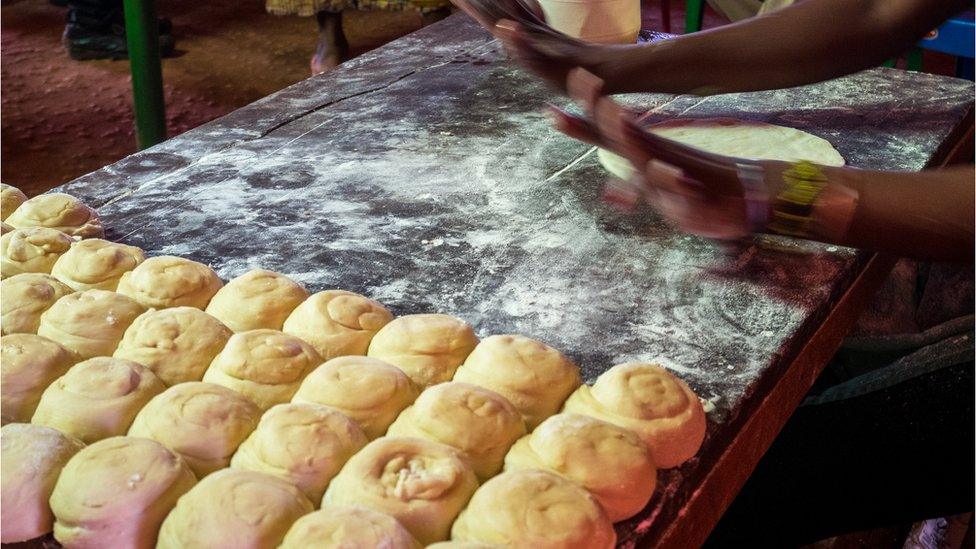
To make chapatis, the dough must be divided into small balls
Back to the shadowy world of the cartels.
They understand the politics of the stomach, that food is at the heart of the Kenyan psyche and dominates social interactions.
Bribes are known as chai or tea.
When an ethnic group is vying for political office, it will argue that it is "our time to eat".
When seeking the approval of or official documentation from a government office, you'll hear that the official in charge is "hungry" - meaning for some little food (a fee) he or she can be persuaded to speed up the process.
I'm on chapati number nine so not long to go now before we eat…

Joseph Warungu:

"The last thing Kenyans need today, is for ugali to become an endangered dish. Which is why, I'm learning how to make chapatis.

By September last year, it was well known that the drought affecting the Horn of Africa would mean food problems in Kenya in 2017.
Indeed in February, President Kenyatta declared the drought a national disaster and warned that those found taking advantage of the situation to enrich themselves would be punished.
Unfortunately because the government did not present a clear agenda for countering the effects of the drought, the cartels moved in.
Which is why a 2kg bag of maize flour presented to a hungry voter turns into a Yes vote for the political donor at the ballot box.
So how exactly did the maize shortage come about?
In other words, how did ugali go missing from my plate?
We don't know.
Instead of answers and data, the president said the shortage of maize and the high food prices date back to 2011 and the man to blame was the then Prime Minister Raila Odinga.
Mr Odinga, who is running against President Kenyatta in the August's vote, responded by saying: "Don't blame me, blame corruption in your government for the current high prices of food".

President Uhuru Kenyatta's government accused of creating an artificial shortage

Presidential candidate Raila Odinga blames corruption for the high prices
None of this back and forth is making ugali any cheaper, so let me see how my chapatis are doing.
They've all turned into the golden-brown colour I was aiming for… not bad at all for a trainee chef!
We're facing the prospects of the most expensive election in Kenya's history.
Politicians are pouring insane amounts of money into the economy thus driving up inflation.
Banks have slowed down their lending and people's wages have stagnated.
Politically, stakes are extremely high and we are already seeing signs of violence ahead of the elections.
Election year in Kenya historically slows down the economy.
The last thing Kenyans need today is for ugali to become an endangered dish.
But just in case, I'm now mastering the art of making of chapattis.


- Published24 March 2016
